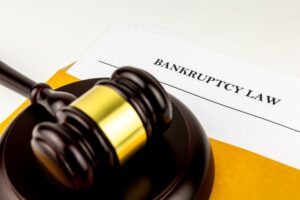Filing for bankruptcy is a major legal decision—and one that comes with strict documentation requirements. If you’re planning to file, getting your paperwork in order is one of the most important steps you can take. It ensures your petition is complete, prevents delays, and gives your bankruptcy lawyer the tools to build a strong case.
So, what documents do you need to file for bankruptcy? Let’s break it down step by step, so you can prepare with confidence and avoid unnecessary roadblocks in the process.
Why Bankruptcy Documentation Matters
Before a court grants debt relief, it must review your full financial picture. That means disclosing everything—your income, assets, debts, expenses, and financial history. The bankruptcy court uses this information to:
- Confirm your eligibility
- Apply the correct exemptions
- Protect your rights (and those of your creditors)
- Prevent fraud or omission
- Determine the appropriate chapter of bankruptcy
Having the right documents ready helps your lawyer accurately prepare your petition and file it with the correct court. If anything is missing or incorrect, it could lead to delays—or even dismissal of your case.
Identification and Personal Information
Start by gathering documents that confirm your identity and legal eligibility to file.
You’ll need:
- A valid government-issued photo ID (driver’s license, passport, or state ID)
- Social Security card or other proof of your Social Security number (like a W-2 or SSA statement)
- Your legal name and any aliases used on financial documents
You may also need to provide information about your marital status, number of dependents, and household composition, as this affects your income calculation and exemptions.
Proof of Income
Your income helps determine whether you qualify for Chapter 7 (which involves a means test) or Chapter 13 (which involves repayment over time). The court needs to verify how much you make and from where.
Be prepared to submit:
- Pay stubs from the last 6 months (some districts may require 60–90 days minimum)
- Profit and loss statements (if you’re self-employed or run a small business)
- Tax returns for the past 2 years (Chapter 7) or 4 years (Chapter 13)
- Bank statements to verify deposits
- Social Security disability, or pension statements
- Child support or alimony income documentation
- Rental or investment income records
Even if you’re currently unemployed, you’ll need to provide details of your employment history or severance benefits.
A Full List of Debts
Bankruptcy gives you relief from certain debts—but only if you list them properly. The court must see every creditor you owe, how much you owe, and the type of debt involved.
Gather:
- Credit card statements
- Loan documents (auto, personal, payday, title loans)
- Mortgage statements and promissory notes
- Collection letters or legal notices
- Medical bills
- Student loan statements
- Judgments or liens filed against you
- Tax debt records (federal, state, local)
Your bankruptcy lawyer will use these to prepare the creditor matrix and ensure all parties are properly notified. Failing to list a debt may mean it’s not discharged—even if it could have been.
A Complete Inventory of Assets
Bankruptcy courts want a full picture of what you own, not just what you owe. This includes real estate, personal property, and even intangible items like copyrights or business interests.
You’ll need to gather documentation related to:
- Real estate deeds and valuations (including your home and any investment properties)
- Vehicle titles and payoff amounts
- Bank account balances
- Retirement accounts and pensions
- Investment accounts and stocks
- Household goods, appliances, electronics, jewelry
- Business ownership, licenses, or inventory
- Lawsuits or settlements you’re involved in
- Trusts or inheritance interests
- Cash value of life insurance policies
These assets are then measured against your state’s exemption laws to determine what you can keep and what (if anything) may be liquidated.
Monthly Expenses and Household Budget
Your household budget plays a key role in determining whether your bankruptcy filing is approved—and, in Chapter 13 cases, how much you’ll be required to repay over time.
Prepare a breakdown of your:
- Rent or mortgage
- Utilities (electric, gas, water, internet, phone)
- Food and groceries
- Transportation and fuel
- Medical expenses and insurance premiums
- Childcare or education expenses
- Loan payments not being discharged
- Support payments (alimony/child support)
- Other ongoing monthly obligations
Be as detailed as possible. These figures help your lawyer complete the court’s official forms and show that you’re acting in good faith.
Financial History and Transfers
The court will look back over recent months and years to determine if any financial activity might affect your filing. You’ll need to disclose things like:
- Property transfers or gifts within the last 2 years
- Repayments made to friends or family
- Large purchases before filing
- Previous bankruptcy filings
- Lawsuits, garnishments, or liens
- Foreclosures or repossessions
If you’ve sold or given away property before filing, the trustee may investigate whether those transfers can be reversed. Honesty here is critical—full disclosure protects your rights and keeps your case on track.
Required Credit Counseling Certificates
Bankruptcy law requires you to complete two education courses:
- Pre-filing credit counseling: This course is mandatory and must be taken from a court-approved agency within 180 days before filing.
- Post-filing debtor education course: This second course must be completed after filing but before discharge. It focuses on budgeting and financial literacy.
You’ll need to provide proof of completion for both. Your attorney can refer you to approved providers and submit the certificates as part of your case.
Business Owners or Self-Employed Filers
If you’re self-employed, a freelancer, or own a business, you’ll need additional documentation. Courts and trustees are especially concerned with income accuracy, asset ownership, and business debt.
Prepare:
- Profit and loss statements (year-to-date and previous year)
- Business bank statements
- Business tax returns
- Inventory lists
- Equipment valuations
- Invoices and accounts receivable
- Contracts or leases
- Licenses or permits
Business owners are often eligible to file for personal bankruptcy, but the process involves more scrutiny. Working with an experienced attorney ensures your case reflects both personal and business realities.
Special Considerations for Joint Filers
Married couples may choose to file jointly or individually. If you file jointly, you’ll need documents for both spouses, even if only one person earns income or holds the majority of the debt.
This includes:
- Joint income statements
- Shared debt accounts
- Joint property deeds or titles
- Household budget as a unit
Your bankruptcy lawyer will help you decide which filing structure offers the most protection based on your goals, exemptions, and credit exposure.
Staying Organized During the Process
Now that you know what documents you need to file for bankruptcy, staying organized is key. Most lawyers recommend creating folders (physical or digital) with labeled categories for:
- Identification
- Income
- Debts
- Assets
- Monthly expenses
- Tax returns
- Legal documents
- Counseling certificates
Keep everything accessible and update it as needed. This not only saves time but can prevent filing delays that impact your financial recovery.
What Happens If You Forget Something?
It’s common to forget a bill, misplace a bank statement, or overlook a detail during preparation. However, if you intentionally leave out key documents or fail to update the court with new information, your case could be:
- Delayed
- Dismissed
- Challenged by creditors
- Converted from Chapter 7 to Chapter 13 (or vice versa)
Working with a qualified bankruptcy lawyer helps you avoid simple mistakes that can lead to serious consequences. Attorneys are trained to spot gaps, ask the right questions, and ensure full compliance with court requirements.
Do You Need Original Documents or Copies?
A common question when preparing for bankruptcy is whether you need to submit original paperwork or if copies are acceptable.
In most cases, clear, legible copies are sufficient—especially for tax returns, pay stubs, and bank statements. However, you should keep original documents available in case your attorney or the trustee requests verification.
For example:
- Your attorney may ask to see original titles or deeds during the review process
- Some trustees may request original tax transcripts or wet-signed documents during the 341 meeting
- Court documents, like petitions or schedules, are filed electronically by your attorney, using digital copies of your paperwork
To stay prepared, it’s a good idea to keep physical copies organized in folders and digital backups stored securely. If you’re ever unsure, your bankruptcy lawyer can confirm what’s required for your district and trustee.
What If You Can’t Find a Specific Document?
Missing documents can delay your bankruptcy case—but in most situations, there are ways to work around it. If you’ve lost paperwork or never received it (such as a W-2 from a past employer or an old loan statement), here’s what you can do:
- Request replacement documents directly from the source (e.g., IRS for tax returns, lenders for account history)
- Provide alternative documentation, like bank statements or affidavits that show the necessary information
- Use a written explanation if the document is truly unavailable, and your attorney can submit this with your filing
The key is transparency. Let your lawyer know early if you’re missing something so they can find a solution before filing. Bankruptcy courts understand that not everything is always available—but they do expect full effort and honesty.
Why Choose Resolve Law Firm to Guide You Through Bankruptcy
When you’re overwhelmed with debt, you don’t just need legal paperwork—you need the right team to walk you through it. At Resolve Law Firm, we help individuals and families take back control with clear guidance, compassionate service, and legal strategies that work.
We understand that bankruptcy is more than just a filing—it’s a life decision. And we take that seriously.
We Help You Prepare Every Required Document
One of the biggest concerns for bankruptcy filers is whether they have the right documents. With Resolve Law Firm, you don’t have to figure it out alone.
We:
- Provide detailed checklists for all required documents
- Help you gather, organize, and review everything
- Make sure no important information is missing
- Submit a complete and compliant petition to the court
Filing for bankruptcy is a legal process. We handle the heavy lifting—so you can focus on moving forward.
Personalized Legal Solutions That Fit Your Financial Situation
When you’re facing bankruptcy, the last thing you need is a generic legal service or an impersonal online form. Your financial situation is unique, and you deserve guidance from a law firm that takes the time to understand your specific needs and goals.
At Resolve Law Firm, we don’t treat bankruptcy as a one-size-fits-all process. We provide personalized legal solutions based on your full financial picture—your income, assets, debts, obligations, and long-term objectives. From the moment you contact us, our team works to build a strategy that aligns with your circumstances and helps you move forward with clarity.
You’ll get:
- A full review of your situation and eligibility
- A tailored plan that reflects your priorities
- Step-by-step support throughout the process
- Answers to your questions from real attorneys—not automated responses
Filing for bankruptcy is a major decision, and you shouldn’t have to face it alone. With Resolve Law Firm, you get trusted legal support and responsive service every step of the way.
We Make Bankruptcy Less Overwhelming
If the bankruptcy process feels intimidating, you’re not alone. At Resolve Law Firm, we focus on clarity and communication, so you always know where your case stands and what happens next.
We’ll explain:
- How each document affects your case
- What to expect during hearings
- How to protect your home, car, and other property
- Your options after bankruptcy
You’ll never be left wondering or second-guessing. We make sure you feel confident in every step.
A Law Firm That Treats You With Respect
We know that debt can feel embarrassing—but it shouldn’t. The truth is, many of our clients are good people going through tough times. Our role is to help you use the law to rebuild, not to judge where you’ve been.
We take the time to listen, understand your goals, and help you make informed decisions about your financial future. When you work with us, you’re more than a case number—you’re a person with a path forward.
Ready to Start? Let’s Review Your Case Together
Filing for bankruptcy is a powerful step—but it’s not something to do on impulse. Preparation is the key to a successful outcome. By collecting the right documents, reviewing your full financial picture, and working with an experienced attorney, you position yourself for lasting debt relief.
Now that you understand what documents you need to file for bankruptcy, the next step is to take action. Speak with a bankruptcy lawyer who can review your paperwork, answer your questions, and guide you toward the best legal solution for your situation.
Call Resolve Law Firm today at (818) 697-9699 to speak with a bankruptcy attorney who’s ready to help you take control of your debt—and your future.













